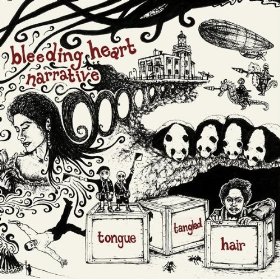Wandering through Bleeding Heart Narrative’s blog in search of evidence, we learn that they are inspired by such aspects of existence as ‘cheap red wine and frantic conversation,’ ‘the lump in your throat,’ ‘crying till you’re spent,’ ‘the minor rush from the first drink when everything is all possibility,’ and so on. All of which leads the listener to expect that Tongue Tangled Hair is likely to be just a tiny bit earnest. This is an album that seems to want nothing less than to commune with humanity; to enter the intangible and create a connection between something beautifully everyday and achingly fundamental.
Tongue Tangled Hair certainly proves that Oliver Barrett is a fabulous and unique musician. He plays with command and empathy, while the production shimmers with ethereal brightness, all empowered by superb command of dynamics. Barrett has more tools at his disposal than seems strictly fair, with his soft, lilting voice; pleasantly tipsy approach to melody; folk instrumentation – including resonating Bartokian piano; intelligent use of samples, synths, reverb and delay; and, of course, the all-pervading strings, fronted by the supremely characterful cello. With them he can do Do Make Say Think; he can do Múm; he can do AMM. He can even do sparse, droneless arrangement, as in the opening of ‘Tilted the Wall’, where the brevity of the pizzicato notes is brought into yet sharper relief by contrast with what precedes them. The whole thing is pulled off with an enviable sense of beauty and dense, inspired musicality.
It is his fondness for drones, more than any other aspect of his sound, that pushes Barrett into the realm of post rock. They certainly dominate the record, in huge lush washes that pulsate and drive – until, by about half way through ‘A Dialogue’, you, and the imagined band of musicians, feel almost drone-drunk; certainly disorientated and a bit seasick.
It’s this utterly immersive experience that is possibly the album’s greatest strength. But might it not be just a little bit too easy to make drone-based composition seem imbued with meaning and sincerity? Drones appear to almost naturally give rise to emotions of foreboding, hope and an overarching sense of instant nostalgia. This is arguably a key factor in the success of post rock as a genre, but one is often left wondering if it isn’t all a bit of a magician’s trick. And if in searching for answers we are drawn instead to lyrics, in this case they are reverbed out of reach. Tongue Tangled Hair is musically sumptuous and highly arresting. But can it really recreate those micro-moments from Barrett’s blogged list of inspirations?


